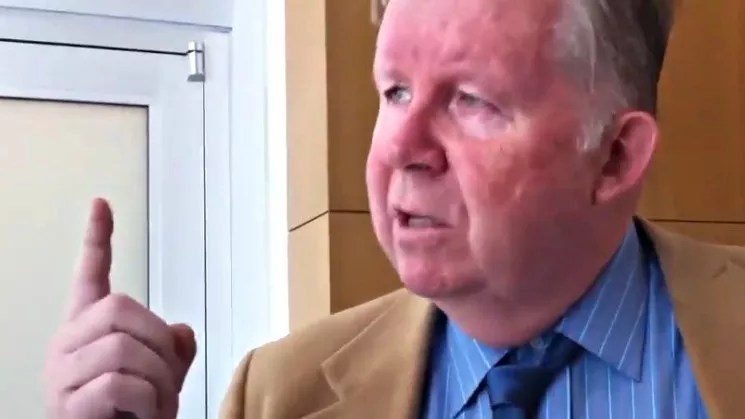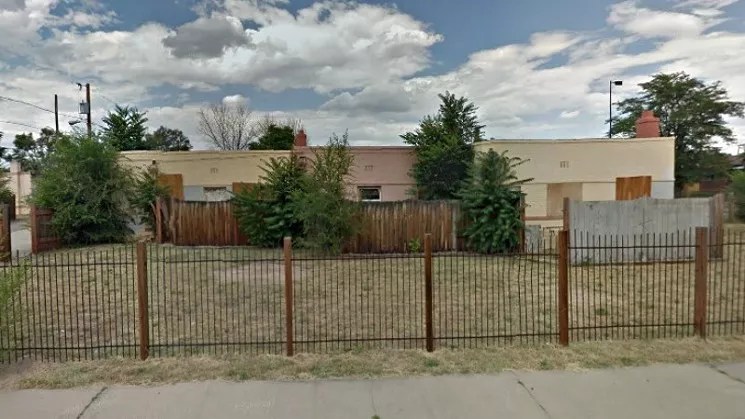
Colorado Springs Gazette via YouTube

Audio By Carbonatix
Douglas Bruce, father of Colorado’s much loved/much loathed TABOR amendment, has a reputation for being perpetually furious. But these days he’s happy about at least one thing: the belated filing of a lawsuit on his behalf against the City and County of Denver for seizing and selling two pieces of allegedly blighted property on which he held the first deed of trust – actions that, by his estimate, have cost him $7 million or more.
Prior to the complaint being served last month, Bruce offered his prediction of Denver officials’ reaction: “They’re going to burn their shorts, so to speak.”
The document was a long time coming. We first wrote about Bruce’s anger related to the two Denver properties – one at 601-609 Lipan Street, the second near the intersection of 37th and York Street – back in February 2019; at that time, he was desperately seeking assistance from a law firm willing to take on the powers-that-be. According to Bruce, the sequence of events that ultimately led to him securing the services of Nathan Garcia, a lawyer with Nonprofit Legal Services of Utah, was both unnecessarily lengthy and exceedingly frustrating.
“It took roughly a year to find an attorney, and I had to get an attorney not in Colorado,” he says. “I contacted over 200 attorneys in Colorado, and they wouldn’t take the case, either because they didn’t like me politically or because they’re cowards and they didn’t want to offend the state judiciary or the City and County of Denver, which is politically powerful. They wanted to be able to get business, and they didn’t want to be blackballed or shunned or whatever. I think it’s an embarrassment to the Colorado bar that I had to find an attorney who wouldn’t be subject to retaliation because his law practice was not primarily in Colorado.”

A pre-demolition view of the property at 37th and York.
Google Maps
Over the years, Bruce’s critics have branded him a slumlord. After Denver seized the York Street plot and sold it to TYL Foundation, an entity acting on behalf of the nonprofit Mile High Ministries, in order to develop low-income housing, Albus Brooks, then a member of Denver City Council, defended the process. He described the property, which has now been demolished, as “a community blight for twenty years” and added that “Mr. Bruce has been completely disrespectful of the community in his upkeep of the property, or lack thereof.”
Bruce sees the matter very differently, and while the lawsuit’s allegations are complex and detailed, he contends that the underlying issues are simple.
“I’ll give you the shortest explanation,” he says, “which is that the government wanted to steal my equity and put it in their pocket, and the City and County of Denver got three spineless Denver court judges, who are employees of the State of Colorado, not employees of Denver, to help them do it – which shows the hatred for Douglas Bruce and TABOR in the Deep State here in Colorado. I had mortgages, two of them, and this would never have happened if the lender wasn’t Douglas Bruce. They set up a special law for the City and County of Denver so they could take away $7 million and counting in loans that go back to 1998.”
If someone holds a mortgage on a home, he continues, “the government can’t come in and say it’s now the owner of your house, and then sell the house and take the sales proceeds and put it in their pocket without having to pay off the mortgage.”
The suit was filed in federal court – the United States District Court for the District of Colorado, specifically – and Bruce says that two 2019 U.S. Supreme Court decisions, Timbs v. Indiana and Knick v. Township of Scott, Pennsylvania, et al., made this legal route possible.
“The Knick case said you don’t have to file first on a federal takings case in state court,” he explains. “That opened the doors for me, because there was no point filing in state court. The state judges are so corrupt that it would have been pointless. What do you expect after forty years of people appointed by Democrat governors? And the Timbs case finally applied the Eighth Amendment from the Bill of Rights to a takings case, after more than 200 years. They applied it to a heroin dealer whose $42,000 Land Rover was seized; they said it was an excessive fine even for being a heroin dealer. And in my case, I’m being fined for doing nothing – for holding a deed of trust.”
In his view, the case “is about people who own property – and the rallying cry of the Founding Fathers was life, liberty and property. They understood that if you don’t have the right to be protected in your property ownership, you are a slave.”
The Denver City Attorney’s Office has not yet responded to our request for comment on the case. Click to read Douglas Bruce v. City and County of Denver, et al.